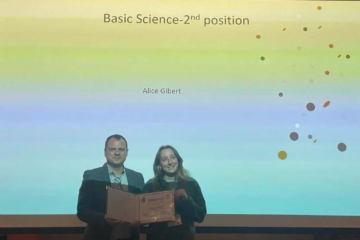Internship proposal – Master 2
An internship is available at the NEURODOL lab in Clermont-Ferrand (UMR 1107 INSERM/Université Clermont Auvergne).
Title: Direct involvement of PLP deregulation in the development of chronic pain symptoms in MS model?
Supervisor: Dr Mélina Bégou
Internship period: January to June 2025
Project summary:
Multiple sclerosis (MS) is a multifactorial autoimmune disease of the central nervous system (CNS),
characterized by demyelination and chronic inflammation, as well as axonal and neuronal loss, affecting 2–3 million people worldwide – specifically 115,000 in France. Among the numerous neurological symptoms of MS, pain is a common disabling symptom often not improved by available drugs. Recent data suggested the involvement of demyelination in the development of chronic pain in which the proteolipid protein (PLP), the major protein of CNS myelin, could be an underestimated but important actor. We notably showed that loss of PLP expression in mice lead to sensitive dysfunctions (pain hypersensitivity and mechanical allodynia) well before motor dysfunctions development. Later, another team described that PLP underexpression could be linked to thermal hypersensitivity and that restoring PLP expression could correct this behavioral alteration. Based on these recent data, and because PLP is highly underexpressed in MS demyelinating lesions, the general objective of our project is to better understand the involvement of this protein in the development of sensitive dysfunctions in MS and to propose new therapeutic target. To achieve this objective, the master 2 internship will be divided in 2 workpackages. One evaluating the corrective effect of PLP spinal overexpression (using viral vector induced gene therapy) in an animal model of MS, namely the experimental autoimmune encephalomyelitis (EAE) mice. The second further characterizing involvement of PLP in sensitive perception modulation using mice with conditional deletion of Plp1 gene (neuronal vs oligodendroglial inactivation).
Because protein restoration using gene therapy is quite easily in animal model but still requires numerous adjustments for its use in humans, particularly in common diseases of non-genetic origin, we need other tools to modify PLP expression. The WP2 aims to pave the way for further characterization of the cellular PLP mechanisms of action in the modulation of sensitive perception in mice with the final objective (in coming years) to propose drugs able to modulate the PLP signalling rather than the PLP expression.
Profile: We’re looking for a highly motivated student with a background in neuroscience, pharmacology and/or cellular biology, with a desire to undertake a PhD thesis after this internship. Validated qualification for experimenting on animals is preferable but not mandatory.
Contact: e-mail: melina.begou@uca.fr
phone: +33 4 73 17 81 02
www.neurodol.fr


0 Comments